

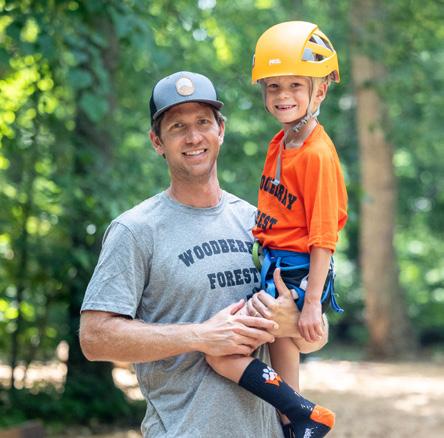




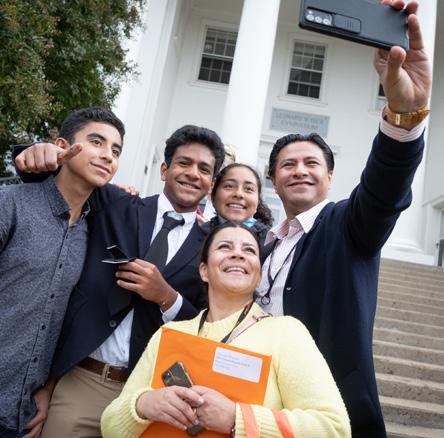
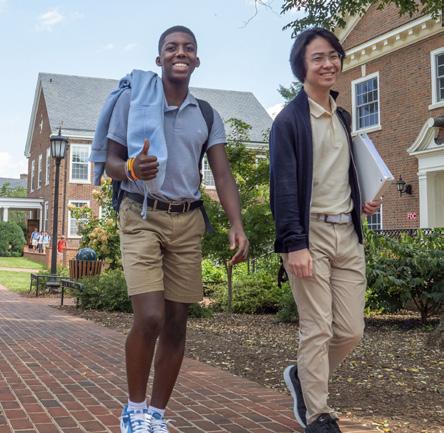
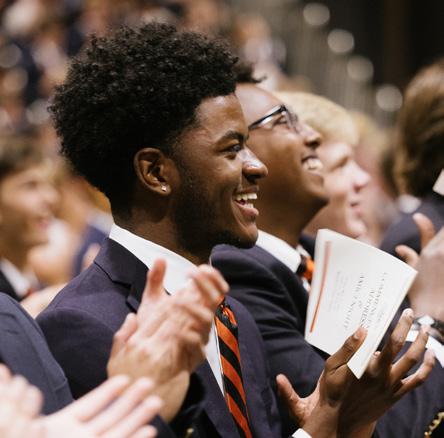
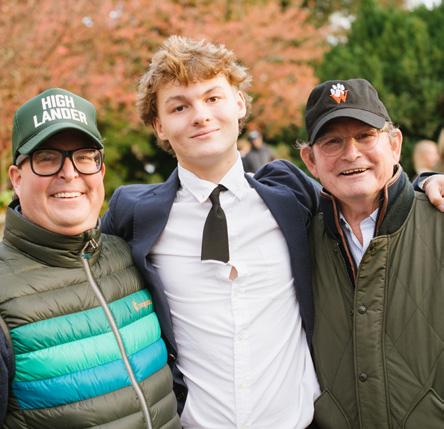









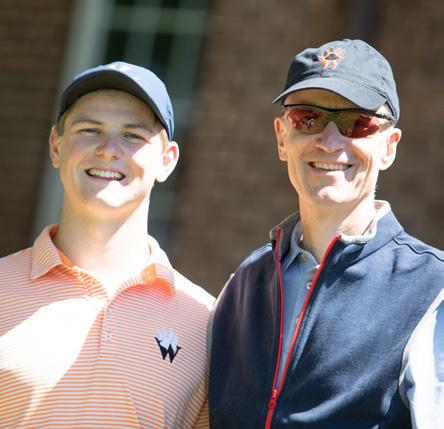


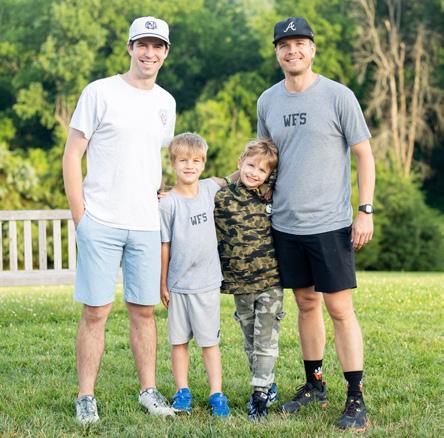

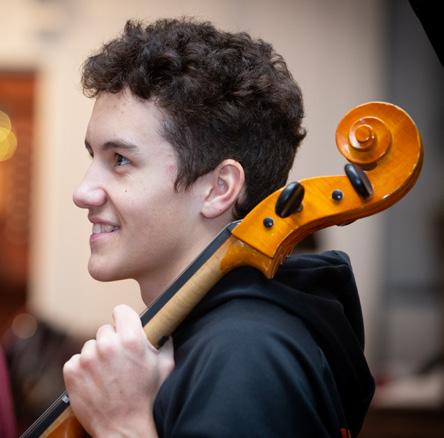
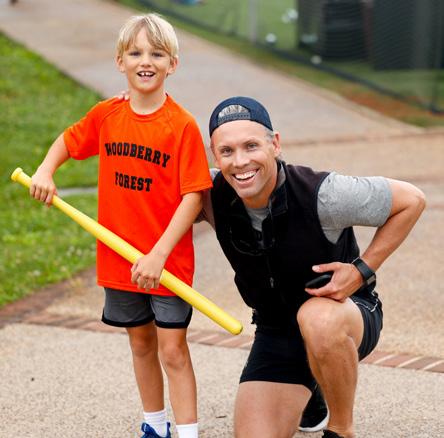


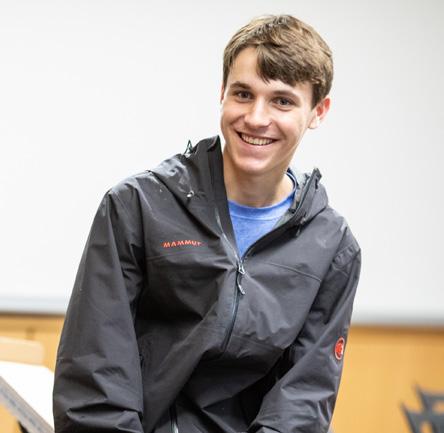
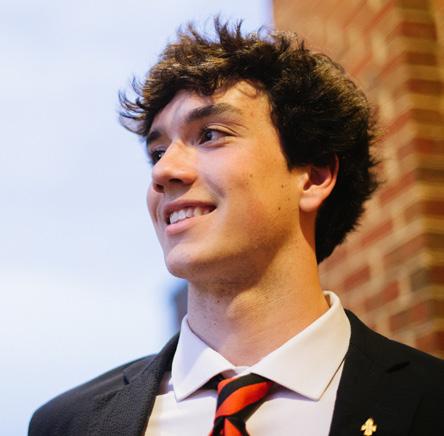





“We try to teach that education is training for service to others rather than success for one’s self; to give rather than to get; for sacrifice rather than gratification.”
J. Carter Walker

Transforming Lives: The Power of the Campaign for the Boys
5 Letter from the Headmaster and Board Chair
6 Impact Summary
Inside the Numbers
School Revenue FY 17 vs. FY 23
10 Tuition Assistance Impact
Woodberry’s Financial Model: A Focus on Long-Term Affordability
Making Woodberry More Accessible
Joseph Stephenson ’17
Nate Ingram ’15
Thomas Mulry ’16
18 Impact on Faculty and Staff
21 The Walker Building
23 Impact of the Challenge
24 Impact of the Amici Fund
27 Campaign Leadership
Campaign For the Boys WOODBERRY FOREST SCHOOL 3
1955
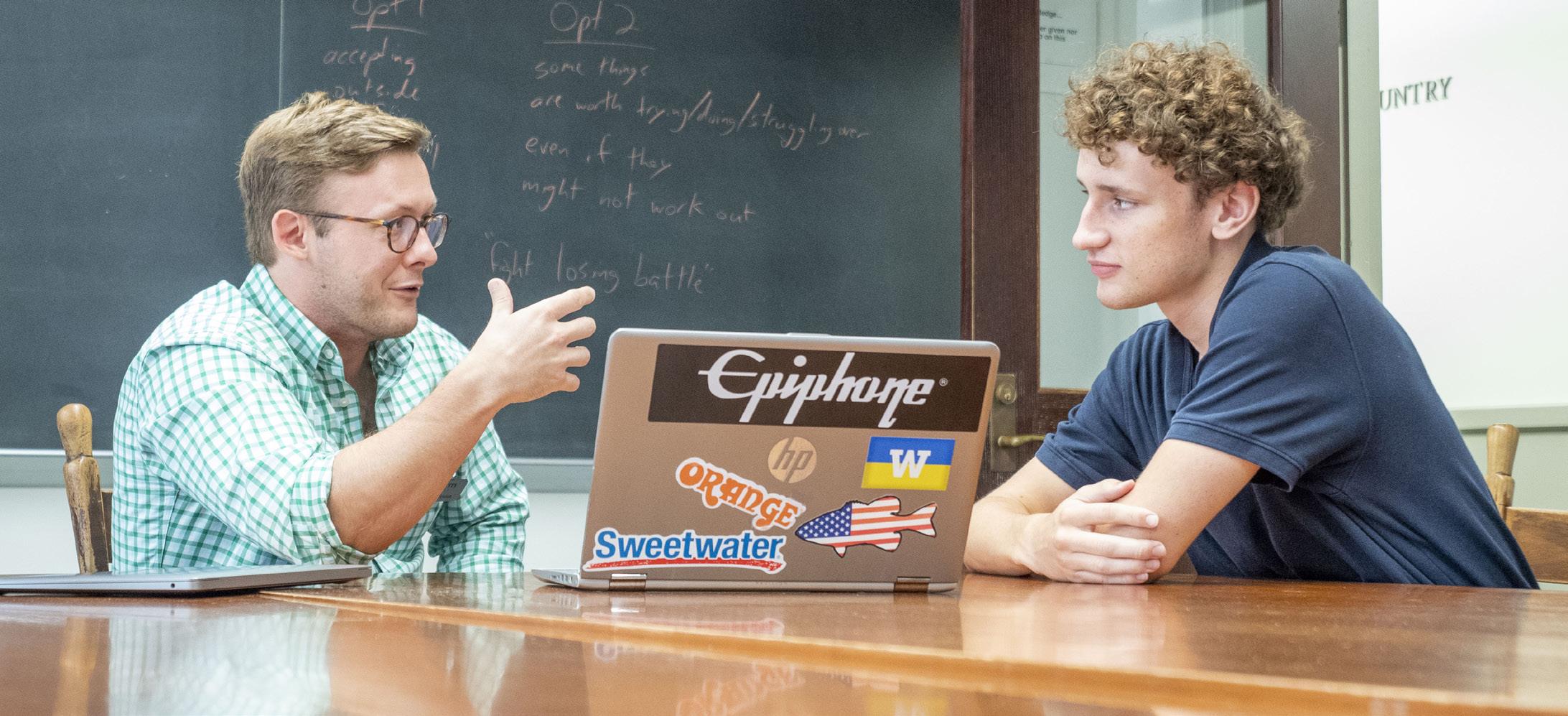


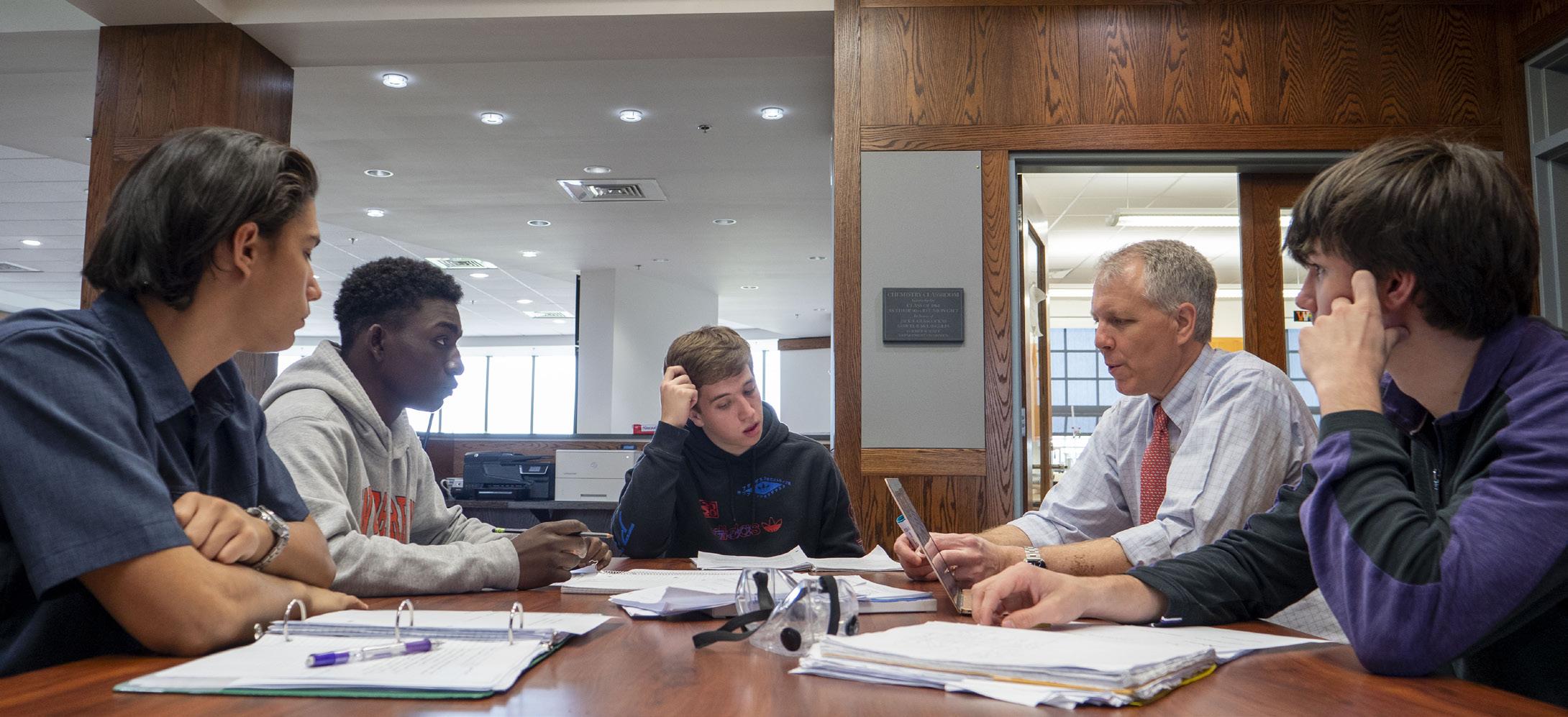
Dear Alumni, Parents, and Friends,
Two months ago, we closed the historic Campaign for the Boys. This noble and ambitious effort began in 2016, and was bolstered along the way by the shared confidence all of you have in this special school. The campaign launched with a goal of raising $125 million. Through your collective generosity, we achieved that goal and then some, ending with a total of $188 million.
Throughout the campaign, we spoke often about our responsibility to care not only for the boys who are here now, but also our unshakable commitment to the boys yet to come. The Campaign for the Boys was a major step toward securing our financial future, allowing us to address critical initiatives from our strategic plan: the renovation of the Walker Building, increasing faculty support, and taking substantive and enduring steps toward fully endowing our tuition assistance program.
The renovation of the Walker Building was the most obvious and tangible of the campaign projects. Because of the generosity of campaign donors, the most visible and iconic building on our campus has been transformed and preserved. The Walker Building touches almost every area of school life. It is where prospective families first begin their admission journey, and it houses the school’s central administration.
The Walker Building sees a steady stream of traffic day and night as students navigate their way through the library, Fir Tree, game room, and store. It is also a place where more than 120 boys sleep, study, and socialize, and a place that five faculty residents call home. Perhaps more so than any other place on campus, it is the physical embodiment of the past, present, and future of Woodberry Forest.
Less visible but even more impactful was the goal to endow tuition assistance. Woodberry thrives when we admit the very best boys from a broad range of geographic and socioeconomic backgrounds, without regard to their financial circumstances. We know from experience that students who seek to better themselves in turn make the school better simply by being here. By endowing tuition assistance, we made a commitment to making Woodberry accessible to all boys by removing the barrier of tuition that has become such a daunting obstacle in private education. Endowing tuition assistance has also allowed us to reduce tuition increases that had, in the past, outpaced family income growth and reduced the number of prospective families that
could afford to fund the Woodberry experience for their sons.
Of course, Woodberry’s ability to deliver on its mission rests squarely on the shoulders of its talented and dedicated faculty. The student experience at Woodberry depends on close relationships with thoughtful and compassionate teachers. Much is asked of the Woodberry faculty, who are not only exceptional educators but also skilled coaches and attentive dorm parents. Our teachers are invested in the lives of their students, and without them, the school is unremarkable, no matter how beautiful our facilities. Hiring and retaining the best faculty comes at a cost. Money raised in this campaign has allowed us to increase faculty salaries and invest in faculty housing so that we are competitive with the best schools in the country.
A final and often overlooked component of capital campaigns is the importance of annual giving. With a thriving Amici Fund, we are able to support, on an annual basis, the broad areas that shaped the Campaign for the Boys. The Amici Fund allows us to keep tuition increases more moderate, invest in higher compensation for faculty and staff, commit to needed renovation of buildings and facilities, and add the extra experiences for boys that make Woodberry so extraordinary. Simply put, without Amici, we’re a lesser school.
Those four areas of focus — the Walker Building, tuition assistance, faculty support, and the Amici Fund — drew overwhelming support, and for your historic generosity we can’t thank you enough. As we write this, the endowment and other managed funds stand at more than $430 million and the school is on firmer financial ground than ever before. As we look to the future, knowing that new and unexpected challenges inevitably lie in front of us, we do so from a position of strength.
The Campaign for the Boys established Woodberry as a place of unmatched loyalty and resolve among its alumni and parent body, and it reinforced what we already knew: this is a remarkable and special community. We could not be prouder to be Tigers, and we thank you for your commitment to Woodberry Forest.
 Byron Hulsey ’86 Headmaster Owen Thomas ’79 Chair of the Board of Trustees
Byron Hulsey ’86 Headmaster Owen Thomas ’79 Chair of the Board of Trustees
Campaign For the Boys WOODBERRY FOREST SCHOOL 5
01 Impact Summary
“We have completely restored the Walker Building. Renovated dorms, new faculty housing, and a student-focused Community Street mean the building continues to hum with life, as it has for more than a century. The Walker Building is a constant in the Woodberry experience across generations.”
TED BAKER ’96, CO-CHAIR
“What was resoundingly clear throughout this campaign has been the interest of the greater WFS community in securing our financial sustainability and forwarding the Woodberry experience for a broader base of boys. We have been able to do this through our institutional commitment to keep tuition increases low and to ensure that Woodberry is affordable for all families.”
DD MATZ (P ’15, ’18, ’21), CO-CHAIR
“We have invested in our faculty and staff. Today every full-time employee earns a living wage. Salaries for teachers have increased thanks to new endowments, and we have built or fully renovated more than a dozen faculty houses. We know the men and women of the faculty are the daily deliverers of Woodberry’s mission. Whether we are hiring new faculty or ensuring veteran teachers can continue to learn and grow, our collective gifts have cared for Woodberry’s most important asset — its people.”
BOB ROPER ’64, CO-CHAIR
$188,282,261
TOTAL RAISED*
above goal
*RANDALL
The Randall B. Terry Fund, a foundation established in 1997 by Randall Terry ’53, distributes funds every year to Woodberry. Over the course of the campaign, the Terry Fund contributed more than $33 million to Woodberry.
Campaign For the Boys WOODBERRY FOREST SCHOOL 7 6 WOODBERRY FOREST SCHOOL Campaign For the Boys
$32,694,612 TUITION ASSISTANCE WALKER BUILDING $12,471,628
$60,554,552
FACULTY SUPPORT
51%
B. TERRY ’53
Capital Support Planned Giving Amici Fund 65% $122,014,743 20% $38,565,882 15% $27,701,637 TOTAL CAMPAIGN SUPPORT JULY 1 2016 $0 2016–17 $16M +16M 2017–18 $51M +35M 2018–19 $79M +28M 2019–20 $101M +22M 2020–21 2021–22 2022–23 $175M +19M DEC 31 2023 $126M +25M CAMPAIGN CHALLENGE INITIATED $156M +30M CAMPAIGN LAUNCH +13M $188M CAMPAIGN CELEBRATION
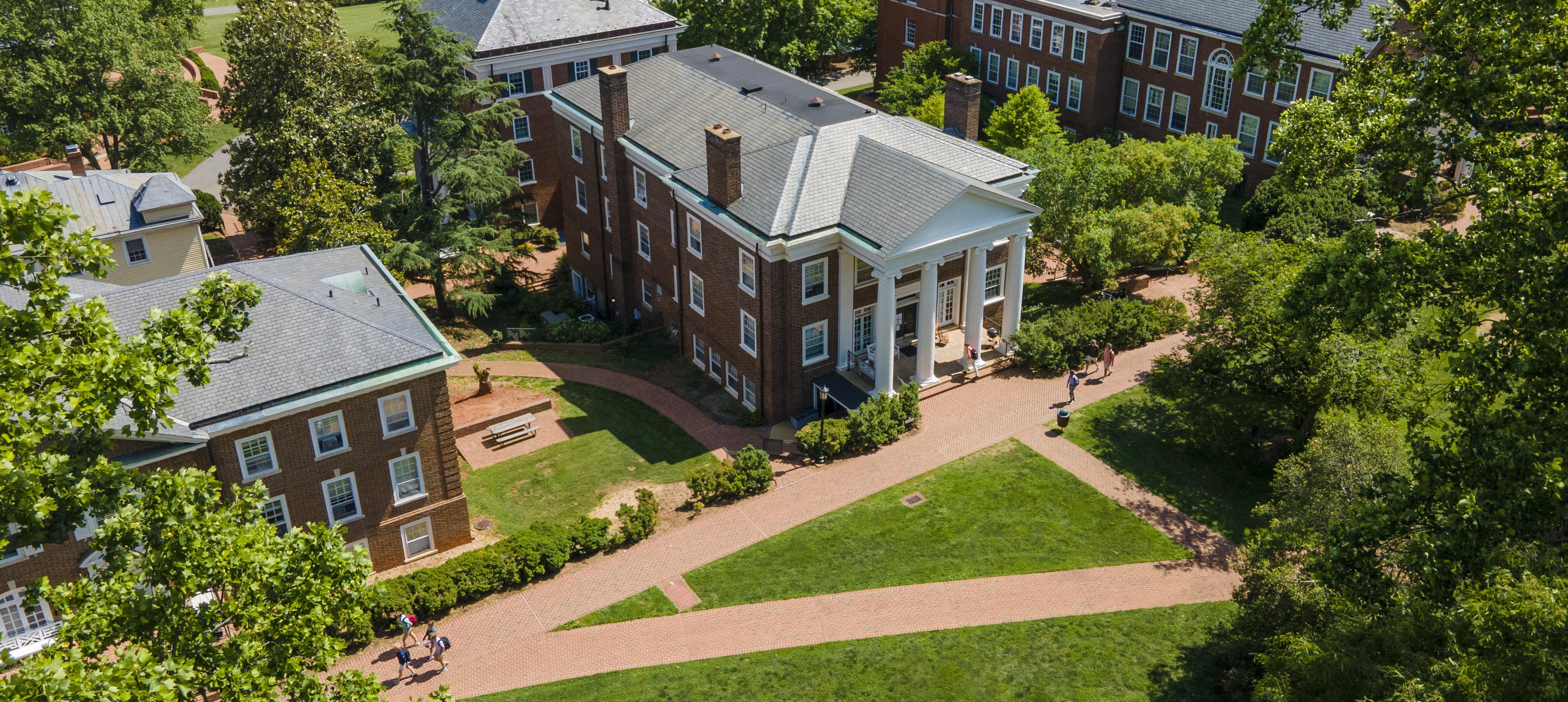
Inside the Numbers
CAMPAIGN TABLE OF GIFTS
Gift Level # Total Value
$10,000,000+ 1 $33,550,000
$5,000,000+ 1 $5,006,310
$1,000,000+ 31 $65,869,903
$500,000+ 29 $18,976,912
$250,000+ 58 $19,490,824
$100,000+ 101 $14,895,111
$50,000+ 140 $9,620,249
$25,000+ 164 $5,539,996
Up to $25,000 7,437 $15,332,957
$188,282,261
$35,538,307
CONTRIBUTED BY MEMBERS OF THE BOARD OF TRUSTEES
157
NEW WALKER SOCIETY MEMBERS
Planned gifts played a pivotal role in the campaign and represent 20 percent of the overall total.
SUPPORT
BY CONSTITUENCY
DONORS
The campaign significantly bolstered Woodberry’s financial outlook. A comparative analysis of philanthropic revenue pre- and post-campaign underscores its efficacy, illustrating philanthropic contributions now constitute 49 percent of the school’s total net revenue stream. This substantial increase in philanthropic support reflects a marked enhancement in the institution’s financial sustainability and underscores the campaign’s success in fortifying Woodberry’s long-term financial stability.
Amici Fund and Other Annual Gifts $4.00 million
$4.49 million
Net Tuition $15.38 million
$17.46 million
2016–2017
Net Revenue
$32.82 million (inner ring)
2022–2023
Net Revenue
$38.87 million (outer ring)
Endowment Transfers
$10.91 million
$14.49 million
8%
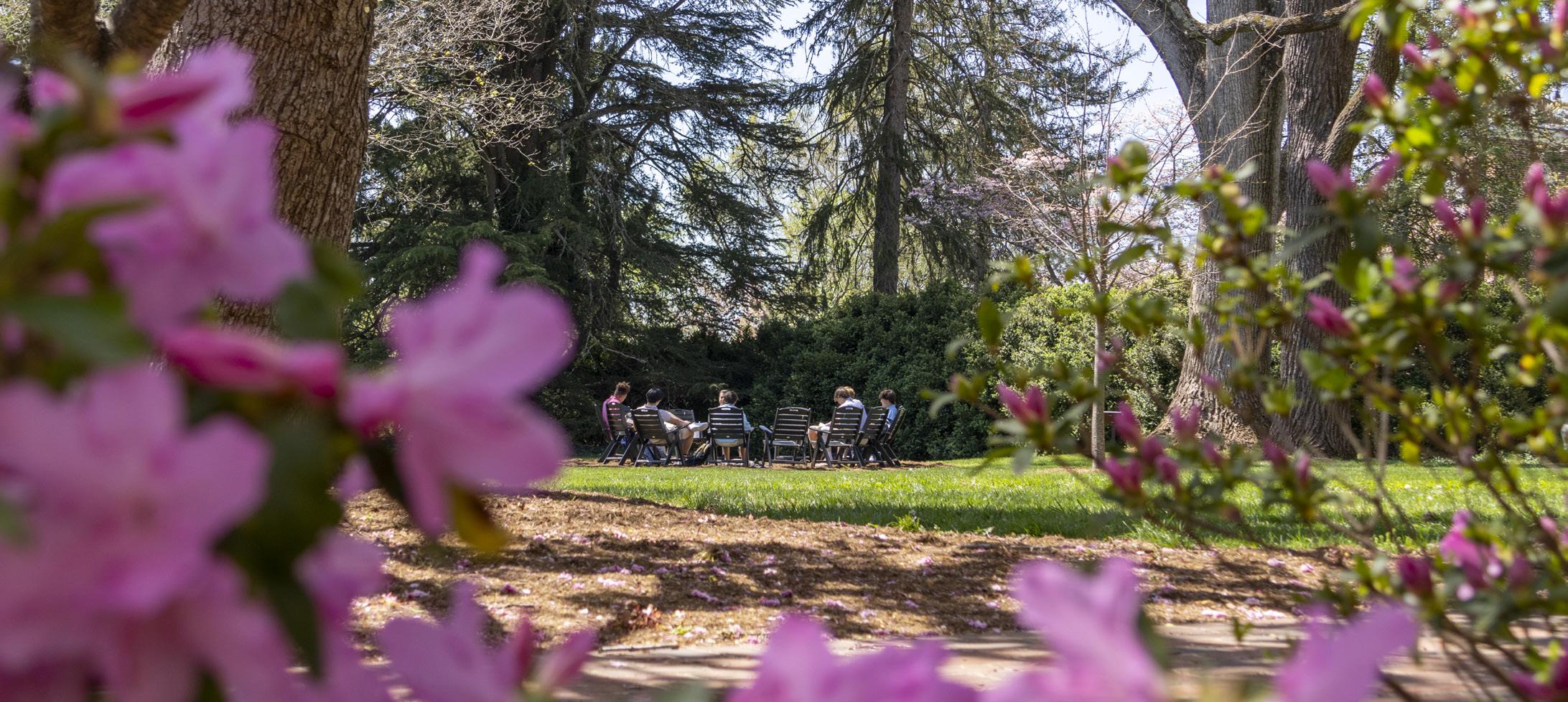
8 WOODBERRY FOREST SCHOOL Campaign For the Boys
33% 45% 12% 12% 37% 47%
Auxiliary, Summer Programs, and Other $2.53 million $2.43 million 6%
School Revenue FY 17 vs. FY 23
Alumni Foundations & Organizations
& Past Parents Faculty, Staff & Friends Grandparents $95M $74M $15M $3M $991k 33%
7,962
Current
02 Tuition Assistance Impact
“At Woodberry, I feel and know I’ve grown as much as I hoped to and more. I’ve had many experiences, achieved many goals, and plan to achieve many more. All of this wouldn’t be possible without tuition assistance. Being at a place like Woodberry is a huge privilege and has had a huge impact on my life. I am truly grateful.”
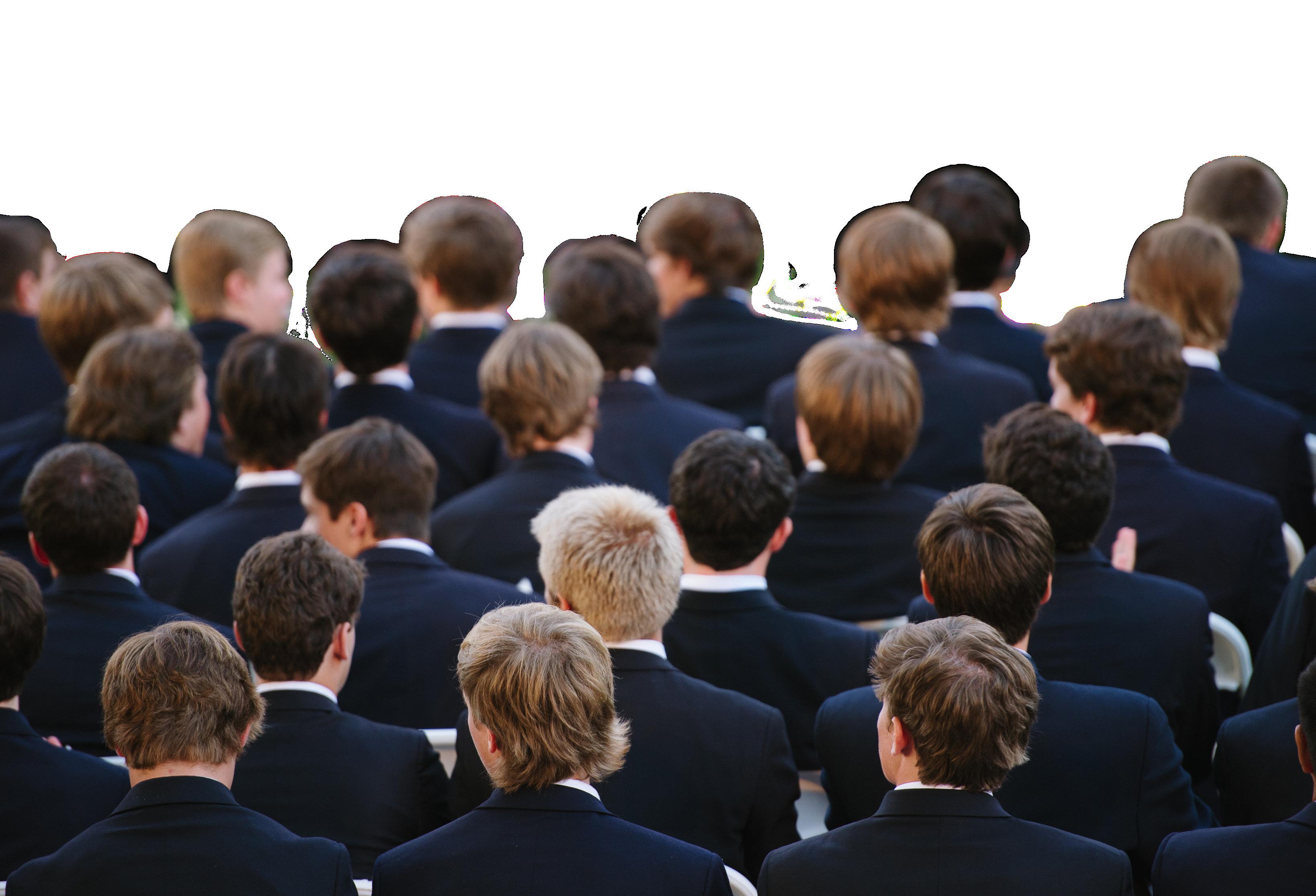
71
NEW SCHOLARSHIP FUNDS
32 75%
OF THE TOTAL TUITION ASSISTANCE BUDGET COMES FROM ENDOWED SUPPORT
AVERAGE TUITION ASSISTANCE GRANT
$32,505
2016–2017 $46,776 2023–2024
44%
NEW NAMED SCHOLARSHIP FUNDS *exceeding $500k in book value
TUITION ASSISTANCE AWARDED
$5.7 million
2016–2017
30%
$7.5 million
2023–2024
Woodberry’s Financial Model: A Focus on Long-Term Affordability
As the Campaign for the Boys worked to fund tuition assistance, the school’s budgeting and investment strategies worked to slow the growth of the cost of a Woodberry education. The 2 percent tuition increase for the 2022–23 school year was the lowest in more than fifty years, and other increases this decade have been below the level of household income growth.
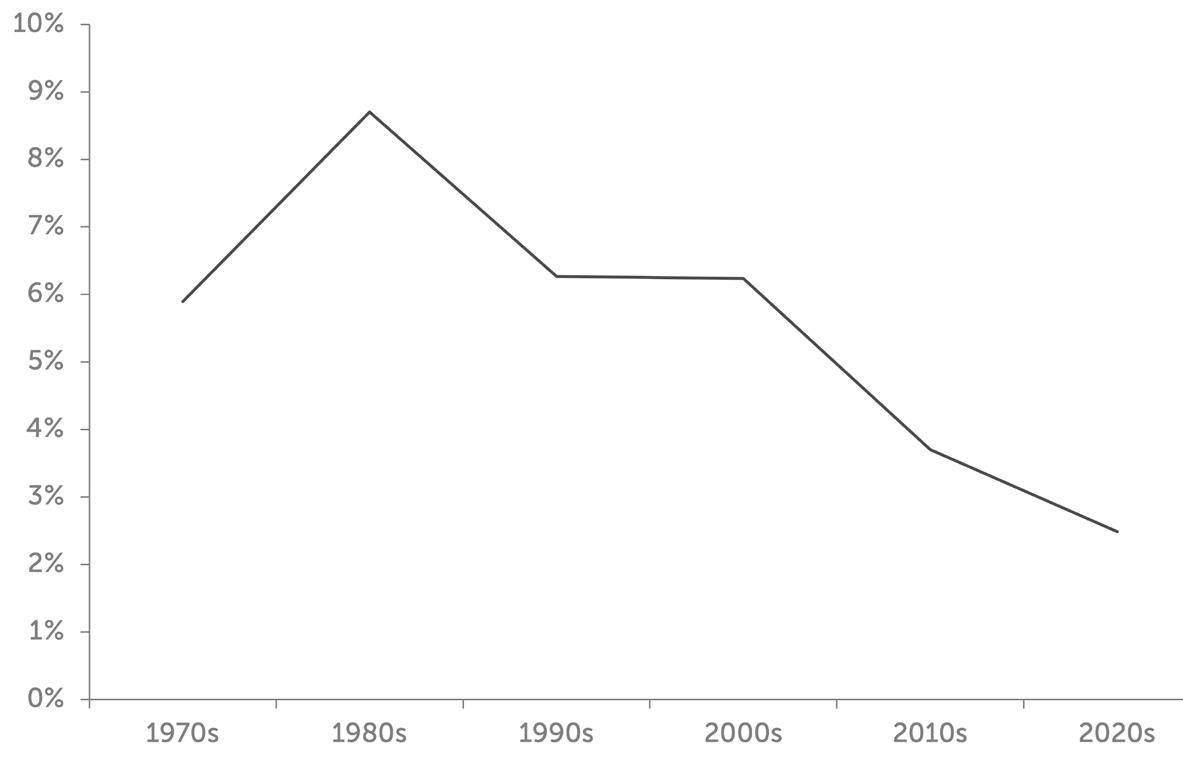
ENDOWMENT AND MANAGED FUNDS GROWTH
$315 million
2016–2017
37%
$432 million
2022–2023
Campaign For the Boys WOODBERRY FOREST SCHOOL 11
AVERAGE TUITION INCREASE BY DECADE 5.9% 8.7% 6.3% 6.2% 3.7% 2.6%
Making Woodberry More Accessible
The Campaign for the Boys aspired to ensure that a Woodberry education was accessible to all promising students, regardless of financial means. Beyond the fundraising efforts and the generosity of donors lie the tangible experiences of individuals – Woodberry boys whose trajectories have been profoundly altered through their Woodberry experience. These narratives illustrate the transformative influence of tuition assistance, and the success of this campaign guarantees future generations the same opportunity.
Joseph Stephenson ’17
As a student at West Point, Joe Stephenson ’17 was better prepared than most. The military environment was highly structured and scheduled, something that was foreign to many students coming out of high school. But for Joe, it felt almost like an extension of what he experienced at Woodberry.
“Not much changed for me when I got to college,” said Joe with a laugh. “At Woodberry, we learned to balance our days, making sure we put in the work for academic success while also participating in extracurriculars. Every second of every day was filled, and the same was true at West Point. It was a natural transition for me.”
Growing up in the small town of Brodnax, Virginia, Joe had never thought much about boarding school. Brodnax is in Brunswick County, on the border with North Carolina. While it is less than three hours from Woodberry’s campus, in terms of opportunities, it may as well be a world away. Joe’s only connection to the school was through his father, who worked with someone whose son went to Woodberry and spoke highly of it. As a talented football player, Joe was also aware of a Woodberry alumnus who was making a name for himself at Notre Dame.
“When I first started thinking about the possibility of going to a boarding school, I’d like to say it was for academic reasons, but at the top of my mind was the prospect of chasing a football scholarship,” said Joe. “And at the time, Greer Martini ’14 was a fixture on
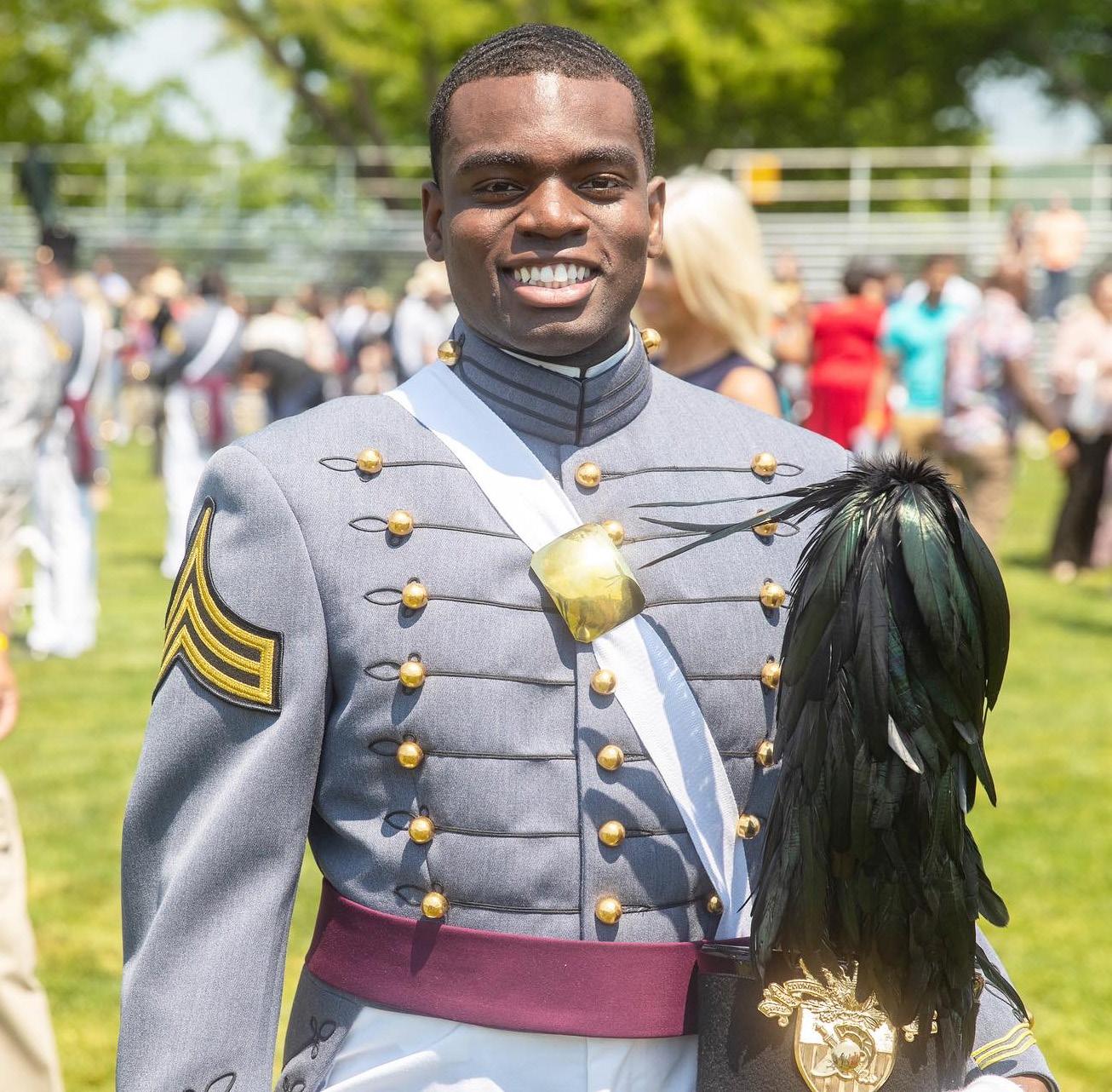
Notre Dame’s defense, and I knew that he had gone to Woodberry. He was doing what I hoped to do, so that certainly influenced my decision.”
When Joe arrived at Woodberry as a new boy fourth former, it was more of a culture shock than he expected. The rigid schedule was unlike anything he’d ever experienced. He had to learn to fit his own priorities into Woodberry’s priorities. Fortunately, he felt like his parents had prepared him well for this leap.
“My parents strongly believed in placing me in uncomfortable situations,” said Joe. “They felt like the most important skill a person can have
is the ability to adapt. And that’s what going to Woodberry forced me to do: adapt. I am so grateful to have had the opportunity to practice and build off those fundamental skills I learned growing up in Brodnax, which in turn prepared me for college.”
It is not lost on Joe that his enrollment at Woodberry was made possible by the school’s generous tuition assistance program.
“Attending Woodberry set me on a different path in life,” said Joe. “The cost of going to a school like that overshadows a potential student’s academic ability and overall potential to excel. However, that barrier was removed by tuition assistance. Tuition assistance opens the door for students who may not have the financial means but do have the ability to adapt and find success.”
Joe was one of those students who did exactly that, excelling on the football field and in the classroom. Even when he struggled academically, he still found a way to learn from the experience.
“I can remember at first really struggling with the overlap of academics and athletics,” said Joe. “Specifically, bombing a chemistry test with Mr. Vickers in the morning and then going out to play in a big football game in the afternoon. Pretty quickly I learned to brush aside setbacks and to just keep going forward.”
Another new experience for Joe was the importance of peer leadership at Woodberry, especially in an environment with so many high-achieving students.
“Woodberry is a school that is filled with leaders,” said Joe. “It’s not easy to navigate that and progress naturally and not compete with
“Attending Woodberry set me on a different path in life. . . . Tuition assistance opens the door for students who may not have the financial means but do have the ability to adapt and find success.”
others while also maintaining a competitive edge. Being chosen as a prefect had a huge impact on my life in that respect. It forced me to have tough conversations with someone my own age. It felt weird at first and was very hard, but I still had a responsibility to do my job. I learned how to separate business from friendship.”
While he appreciates how much he learned at Woodberry, Joe’s favorite part of the experience was the camaraderie and the lifelong friendships he established with both classmates and teachers — people he never would have met had he not accepted the opportunity Woodberry offered him.
“That’s what tuition assistance does . . . it brings together people from so many different backgrounds,” said Joe. “As I look back on my time at Woodberry, I can see that financial aid allowed for diversity of thought within the school and the student body, which leads to better ideas being generated. It gives all students a better sense of what the world outside of the Woodberry campus actually looks like. It’s what makes Woodberry such a special place.”
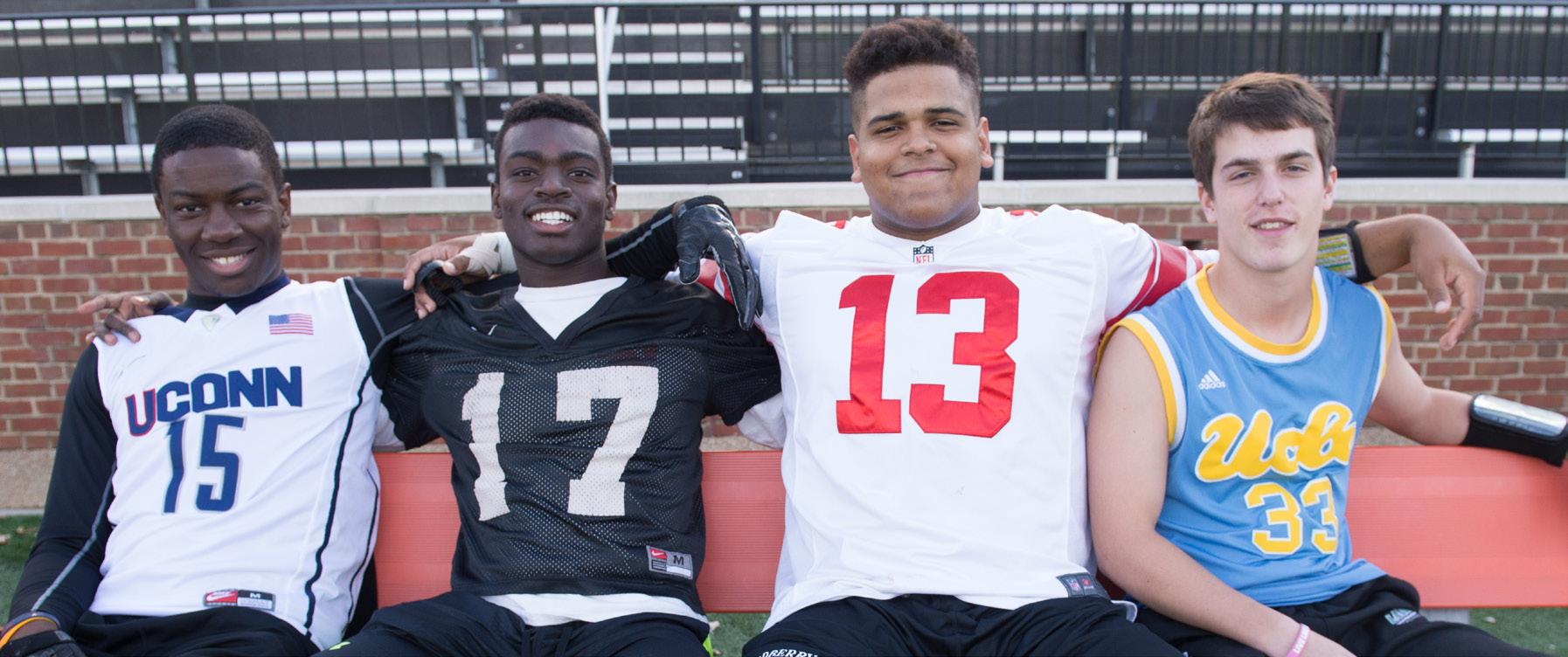
12 WOODBERRY FOREST SCHOOL Campaign For the Boys Campaign For the Boys WOODBERRY FOREST SCHOOL 13
Bebe Olaniyan ’17, Joe Stephenson ’17, Derek Lora ’17, and Coleman Bishop ’18
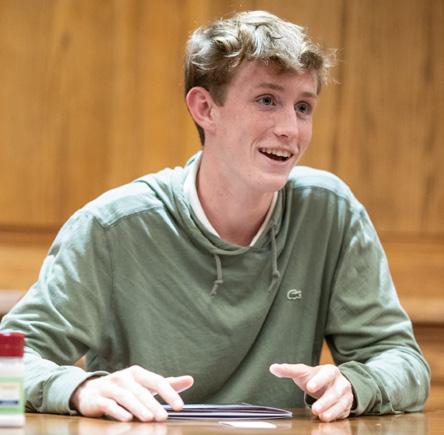

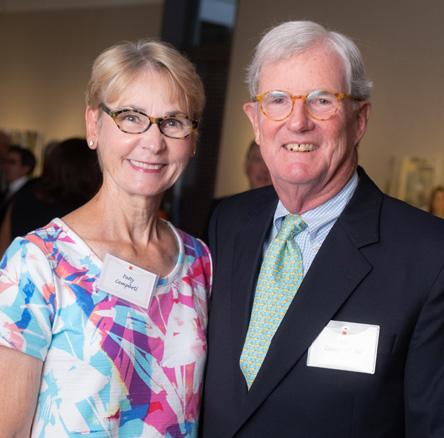

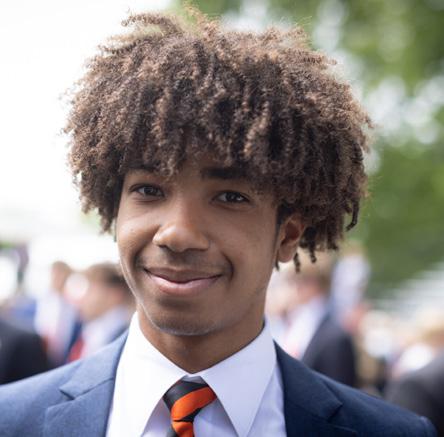
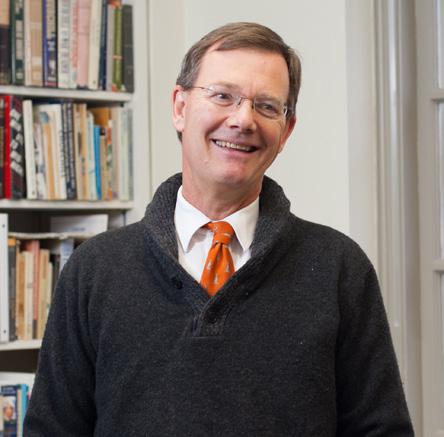
Nate Ingram ’15
Nate Ingram ’15 fell in love with Woodberry long before he became a student. When he was twelve years old and a self-described sports junkie, Nate enrolled in Woodberry Forest Sports Camp. For three weeks in the summer of 2009, he got to live the teenage boy’s dream: a sleepover camp where the sole focus was on playing a multitude of sports and hanging out with friends.
“Sports Camp had a huge impact on me,” said Nate. “Not only being able to play different sports, but also getting to know the counselors. In my eyes, these guys were everything I wanted to be. And almost all of them were Woodberry boys. That put the bug in my head that someday I wanted to go to school there.”
Growing up in Charlottesville, Virginia, Nate’s older brother was the first to dip his toes in the boarding school waters.
“My brother went to Christchurch, so when I raised the idea of boarding school with my parents, it didn’t come as a shock,” said Nate. “Boarding school just seemed like the coolest thing in the world . . . living with your best friends, going to classes together, hanging out in the dorm, playing sports. What isn’t there to like?”
Despite his eagerness, the reality of Woodberry Forest was still something of a shock. Nate’s only exposure to the school was through Sports Camp. He had no idea how rigorous and thorough the academics would


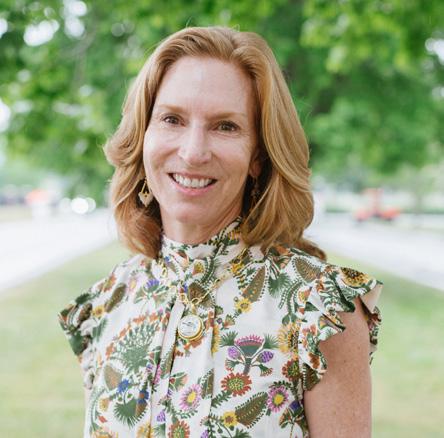

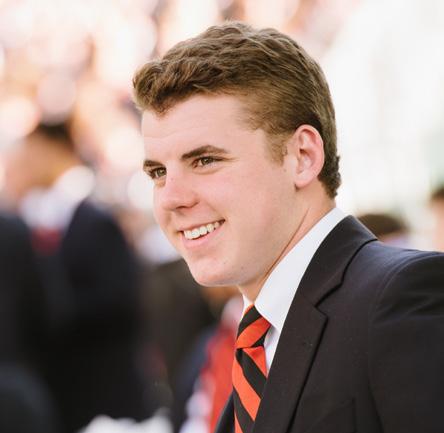






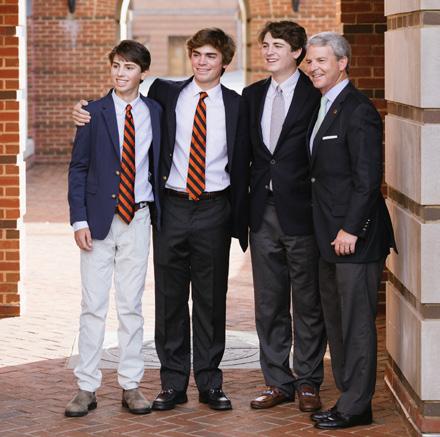



be. He also learned fairly quickly that his attitude would need to change.
“I have to admit that when I got to Woodberry, I was a pretty cocky kid,” said Nate. “I was ambitious and wanted straight As and wanted to make all the varsity teams. That probably rubbed some people the wrong way, but my heart was in the right place. And over time, that
cockiness turned into focused confidence. I learned how to succeed without being boastful. And a lot of that came as a result of watching how the older boys conducted themselves. I learned so much from them, and I did a ton of maturing over those four years.”
After Woodberry, Nate went on to attend the University of Virginia, where he continued to excel. He attributes much of his success to the preparation he received at Woodberry.
“The transition to college, especially living away from home, was pretty easy,” said Nate. “At Woodberry, I learned so much about being personally responsible for my work. And academically, I felt like I had a very solid foundation.”
Nate attributes that foundation to a number of teachers who pushed him in the classroom and on the athletic field. Whether it was John Amos as his advisor, sparking an interest in reading and writing when, prior to Woodberry, “I did not see myself as an English person at all,” or Ted Blain reinforcing that belief that he could be a good reader and writer. In Fred Jordan’s history and government classes, he learned to care about American politics and what was going on in the world, which led to him studying government and economics at UVA. Outside of the classroom, Nate thinks back on the unique boarding school experiences that helped shape who he is, singling out late-night conversations
“I firmly believe that financial circumstances should never be a barrier to attending Woodberry. . . . and I hope that I can play a part in providing access to more boys like me in the future.”
with Ryan Alexander in Dowd-Finch when he was a fifth former, when the two would talk about big issues in life. He also grew as a person when he was named a school prefect, and found himself in a position where he was expected to enforce and uphold the school’s honor system, which inevitably resulted in difficult conversations and decisions.
“Every aspect of my time at Woodberry means so much to me,” says Nate. “I never would have been able to have that experience were it not for tuition assistance. That is the reason I give to Woodberry, and it is the reason I’m an alumni volunteer. I firmly believe that financial circumstances should never be a barrier to attending Woodberry. A high-quality education should not be reserved strictly for the wealthy. I owe so much to the school, and I hope that I can play a part in providing access to more boys like me in the future.”
14 WOODBERRY FOREST SCHOOL Campaign For the Boys Campaign For the Boys WOODBERRY FOREST SCHOOL 15
Thomas Mulry ’16
“Timid and scared” is how Tom Mulry ’16 described his teenage self when he first enrolled at Woodberry. “The first couple of weeks were very hard. I was shell-shocked, coming from a small town in northern Virginia.”
Though boarding school was not a foreign concept to Tom — his mother was a Foxcroft alumna, and he had cousins who had attended boarding schools in the Northeast — all Tom really knew about Woodberry was what he saw when he was enrolled at Sports Camp when he was eleven years old.
“I had such a great experience at Sports Camp,” said Tom. “I went for two years. I lived on Dowd-Finch and had the best time living with the other kids and looking up to the counselors.”
Despite his difficult transition as a new student, Tom threw himself into the experience and is grateful to have been in a school that gave him room to grow. He played football for all four years, starting on the Bengal squad and working his way up. He recalls third-form English classes with Brian Stephenson, which he credits with preparing him for college. And more than anything, he learned resiliency.
“At Woodberry, I quickly realized that you have to put in the work if you want to compete,” said Tom. “I also learned that you need to be flexible in your thinking. In particular, I remember taking AP Chemistry where there was a huge emphasis on problem solving. The skills and habits I picked up in my classes there continue to resonate today. And I always had teachers helping me along. Guys like my advisor, Donald



Brewster, who was there for me during some tough times in my life and made me feel like I had an ally at school — someone I could rely on and talk to anytime I needed to. Or Ryan Alexander, who was both my English teacher and football coach, going to his apartment to watch the Super Bowl when I was a junior, making the school feel like home.”
As big as the adjustment was coming to Woodberry, Tom’s start in college felt equally intimidating. However this time, he had a solid foundation to build on. He knew what worked
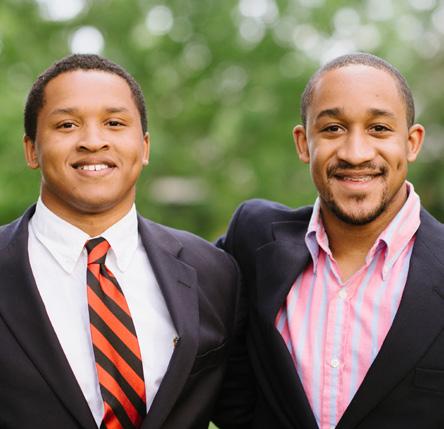
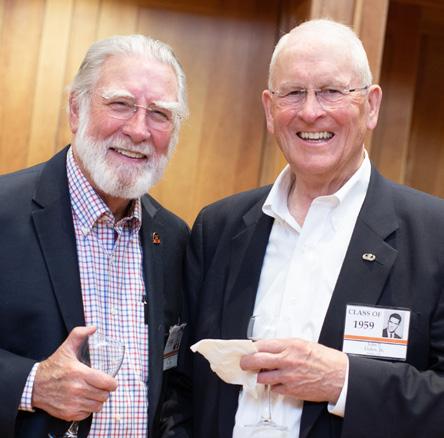
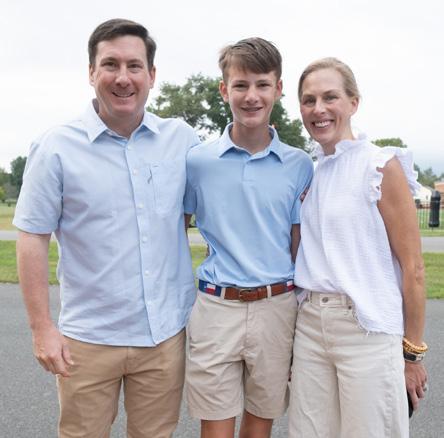



and what didn’t from his time at Woodberry, and so he faced new challenges with greater confidence.
“Probably the most important thing I learned at Woodberry was that you need to take care of your own business. No one else is going to do it for you,” said Tom. “No matter how big the class size, there’s never a reason to hold back from asking a question. That mindset allowed me to feel comfortable in any environment. Or in cases where I was uncomfortable, to not let that discomfort hold me back from asking anyway. At Woodberry, where you are living away from home, you grow up a lot in those first few years.”
As a student who was able to enroll at Woodberry with the help of tuition assistance, Tom took full advantage of the opportunity he knows doesn’t get offered to everyone.
“Tuition assistance allowed me to go to Woodberry, pure and simple,” said Tom. “One thing I really appreciated was that from the moment you walk on campus as a new boy, everyone is treated equally. There is no special treatment for anyone. So once you are given the opportunity to go there, it is up to each student to make the most of it. Once you get there, regardless of whether you receive tuition assistance or not, you are one of the one hundred or so new boys, and the rest is up to you.”
Tom certainly made the most of it, and treasures every memory. Whether it was the fun and challenge that came with the fourth-form expedition, spending time away from school with the guys in a completely different setting, or seeing everything come full circle when
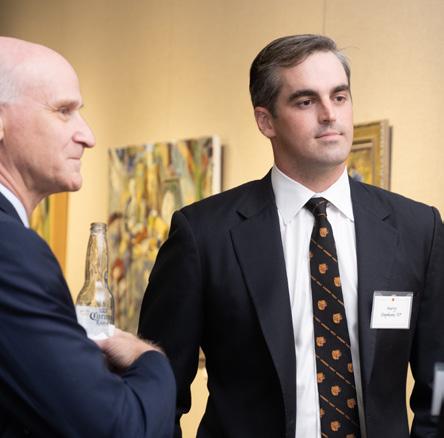



“One thing I really appreciated was that from the moment you walk on campus as a new boy, everyone is treated equally. . . . Once you get there, regardless of whether you receive tuition assistance or not, you are one of the one hundred or so new boys and the rest is up to you.”
he returned to Sports Camp to work as a counselor, getting the opportunity to coach the younger kids. The moment that stands out for Tom most vividly, however, is Senior Shake.
“That was an emotional moment,” he said. “It was almost surreal. I got pretty choked up because it hits you all at once that the four years that you spent here, while there were certainly some tough moments, I can’t imagine not having them.”
After graduating from Drexel University with a degree in engineering, Tom is now working for an ion exchange company in Philadelphia, with a focus on nuclear power plants and arsenic removal from groundwater. At a growing company, one thing he appreciates is that despite his young age, he is encouraged to speak up and share his opinion — something he learned well during his years at Woodberry.
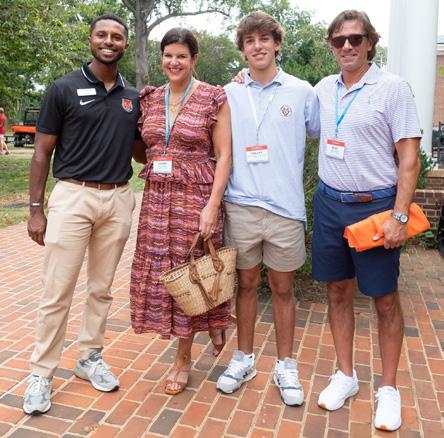
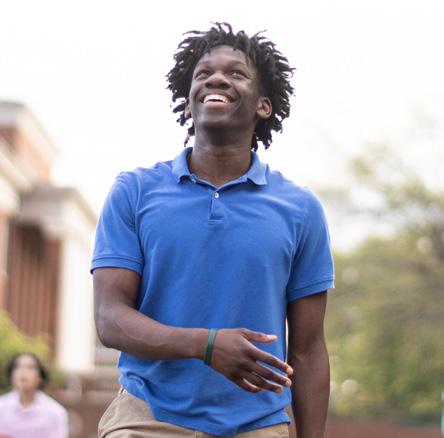
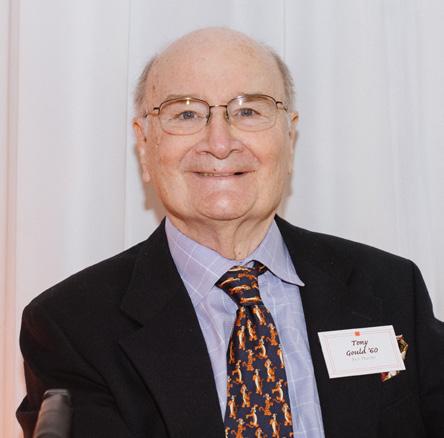


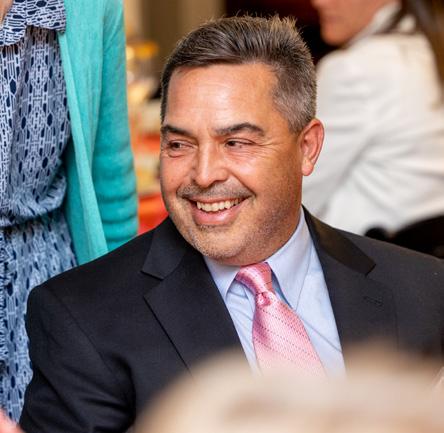

 WOODBERRY FOREST SCHOOL Campaign For the Boys
Campaign For the Boys WOODBERRY FOREST SCHOOL
WOODBERRY FOREST SCHOOL Campaign For the Boys
Campaign For the Boys WOODBERRY FOREST SCHOOL
03
Impact on Faculty and Staff
“Here at Woodberry, we know that boys are relational learners and that the connections they build with faculty and staff in the classroom, on dorm, and on the field are paramount to their ability to grow. Money raised to support faculty and staff is money invested in the true engine of Woodberry Forest: the people who create the environments for our students to thrive. Our ability to attract and retain faculty of high character, ability, and sense of purpose is a key component to all of our strategic initiatives.”

7
NEW FUNDS FOR FACULTY SUPPORT
9
NEW PROGRAM FUNDS
39 $5.5 million
NEW OR RENOVATED FACULTY HOMES
IN IMPROVEMENTS TO FACULTY HOUSING
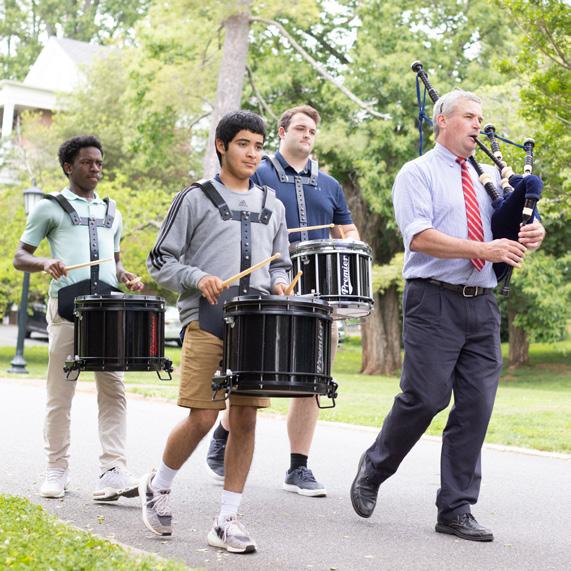

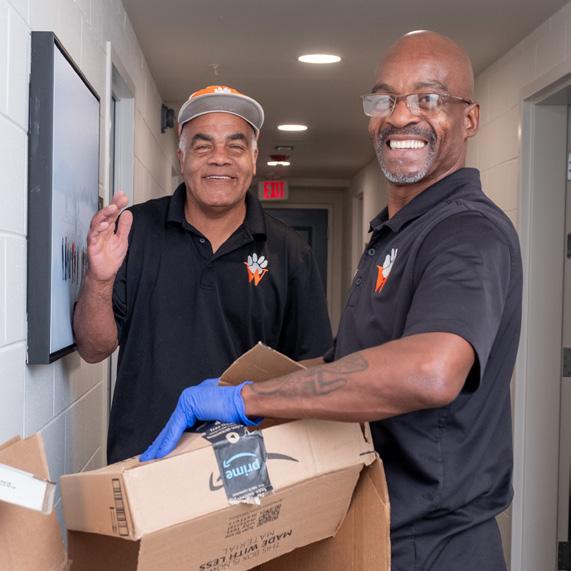
LIVING WAGE INITIATIVE
The Living Wage Initiative began in 2018 when twenty-three full-time employees were earning less than $15 per hour, which at the time was considered the minimum living wage threshold. The initiative included higher-than-average salary increases for all employees earning less than $25 per hour, and by 2022, all full-time employees were earning at least $15 per hour.
Woodberry’s faculty salaries have also increased with targeted improvements across all levels of experience over the last five years, reaching the first quartile mark compared to peer schools, an important indicator of the school’s ability to compete for a shrinking pool of triple-threat faculty.
One of the new faculty houses completed in 2022 and home to the Erickson family.
Campaign For the Boys WOODBERRY FOREST SCHOOL 19
Abbie Mills Assistant Headmaster for Academic Affairs

The Walker Building
“One hundred twenty-five years ago, the walls of the Walker Building began to rise from the Virginia clay. It was a moment of audacity and faith.”

04
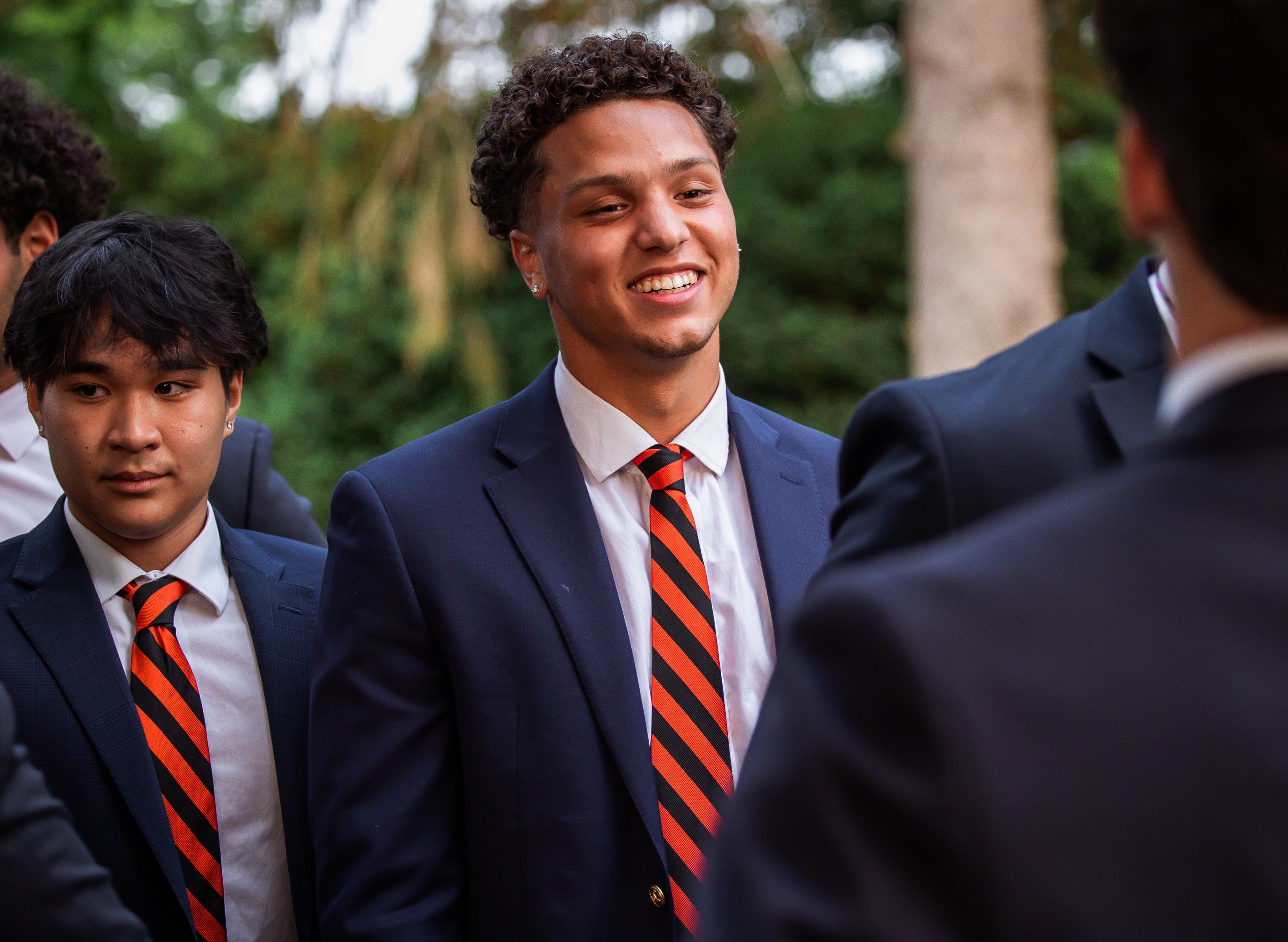
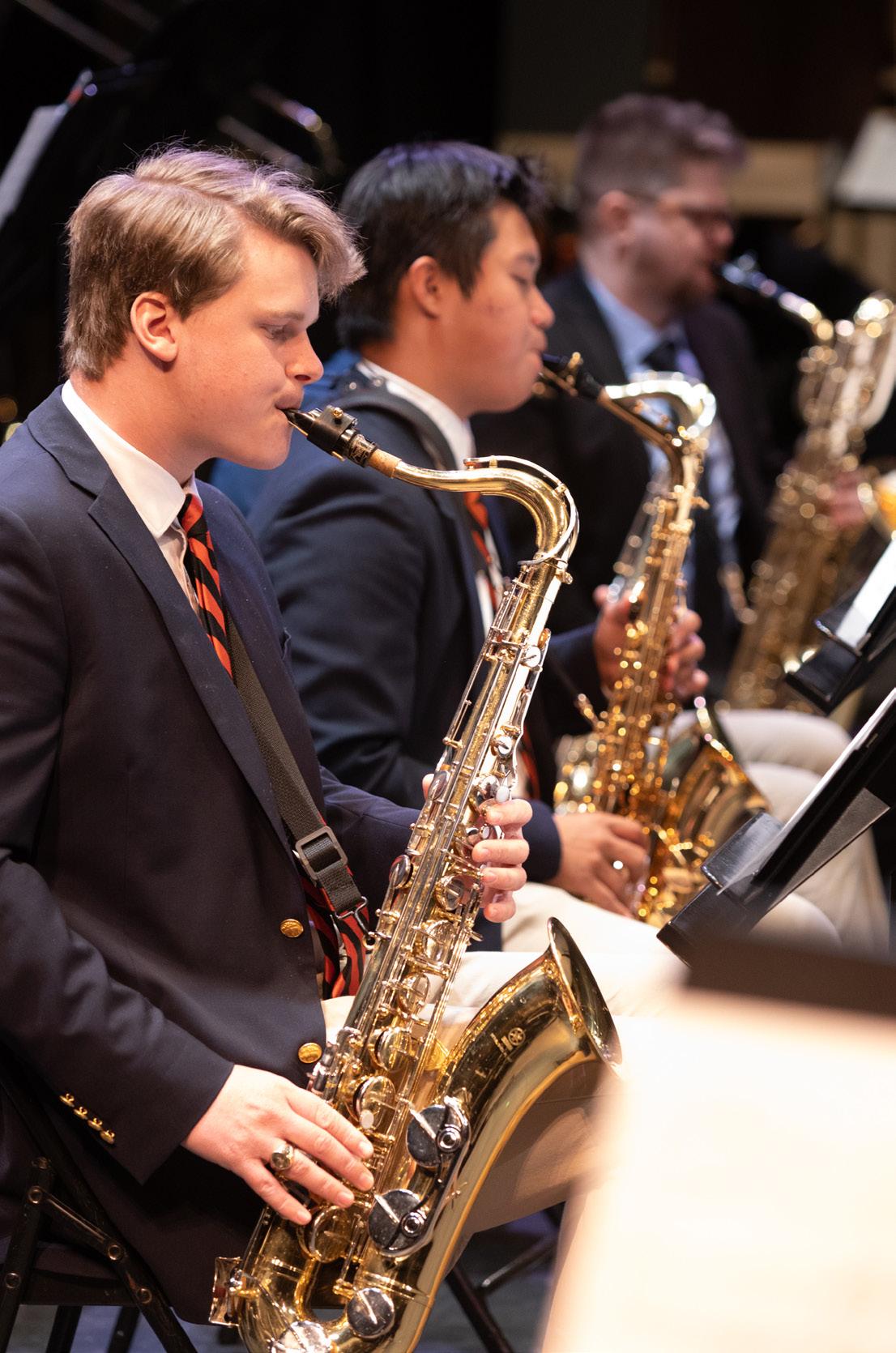
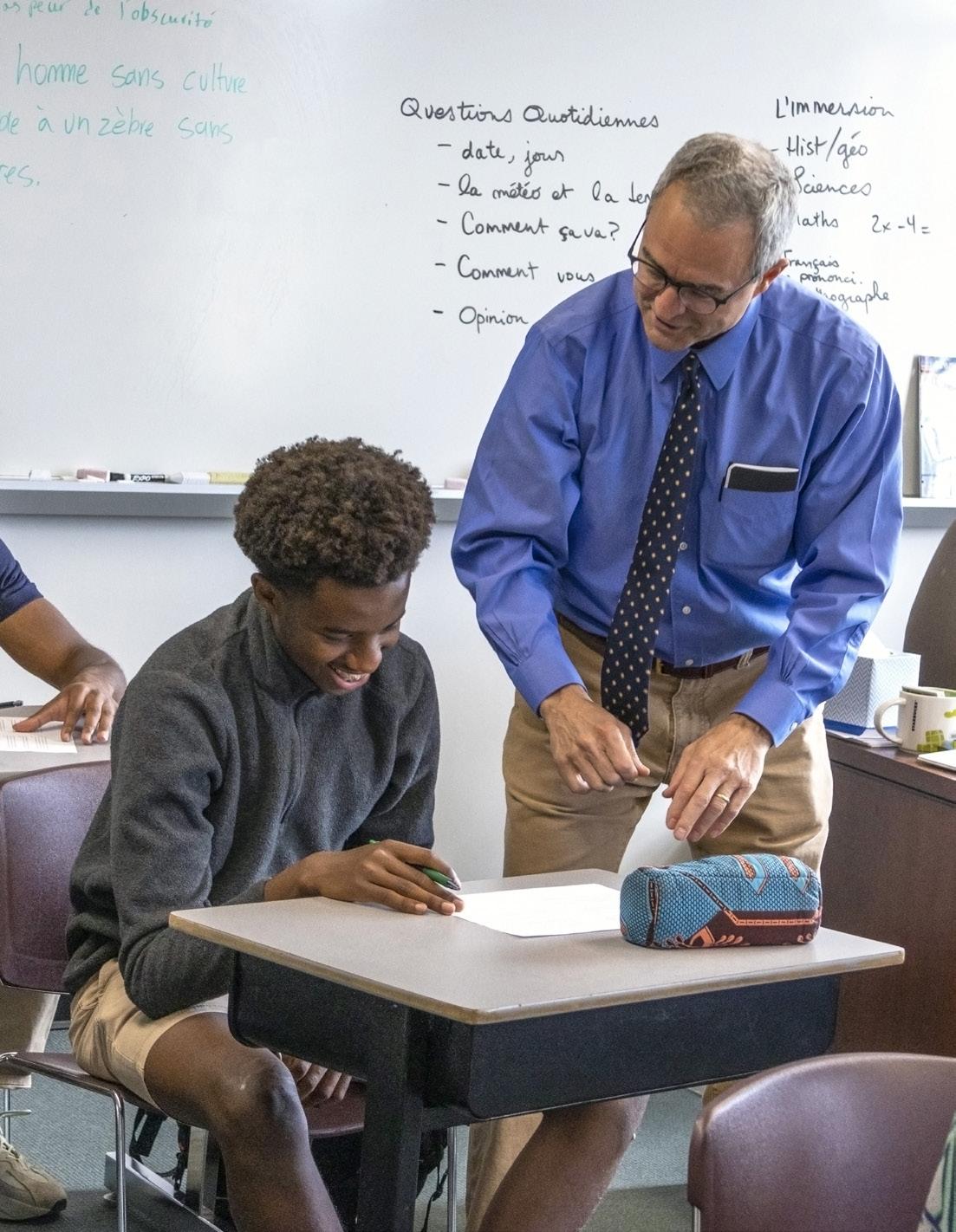
05
The Impact of the Challenge
At a critical juncture in the Campaign for the Boys and as we came out of the pandemic in May 2021, three leaders in the Tiger community stepped forward to generate momentum designed to bring the campaign over the finish line.
Fred Lummis ’71, Laura Bucholz, and Bill Caler ’63 challenged current and former trustees, and then extended the challenge to the Woodberry community at the public launch of the campaign.
Assistant Head of School Catherine Wharton noted the board-led challenge representing past and present leadership united the entire Woodberry community, and that the ripple effect of the challenge established the groundwork for the financial future of the school in perpetuity.
The most successful fundraising years of the campaign were FY 2021 and FY 2022, a direct result of the challenge.
INITIAL CHALLENGE GIFT
$5 MILLION
CURRENT TRUSTEES
$5 MILLION
FORMER TRUSTEES
$10 MILLION
TOTAL CHALLENGE
$20 MILLION
TOTAL IMPACT OF CHALLENGE $52.9 MILLION
Campaign For the Boys
06
The Impact of the Amici Fund
The Campaign for the Boys was a transformational effort that galvanized Woodberry’s fundraising over seven remarkable and productive years. While the campaign ended in December 2023, a core component of it will continue on: the Amici Fund.
The Amici Fund is the foundation upon which all philanthropy is built at Woodberry and has been the through line since the early days. The tradition of widespread community support for the Amici Fund elevated to new heights during the campaign. Over the seven years of the campaign, 6,779 alumni, parents, grandparents, and friends contributed more than $27 million to the Amici Fund. More than 60 percent of alumni contributed to the annual fund in each of the seven years of the Campaign, and parent participation reached 94 percent.
Current-use philanthropic dollars play a critical role in the day-to-day governance of the school, accounting for 12 percent of the annual operating budget. Equally important, the commitment of support demonstrated by our many constituents ensures that the values Woodberry holds so dear — fostering a deep sense of empathy, an enduring self-confidence buttressed by genuine humility, and an enthusiastic pursuit of lifelong learning marked by curiosity and adaptability — will be passed on to future generations of students. Gifts to the Amici Fund strengthen us in every way.
Philanthropy is a collective effort that involves more than just financial support, and the Amici
Fund wouldn’t meet its goals were it not for the more than one thousand volunteers — trustees, Advisory Council, regional chapter, alumni class, and parents — who generously give their time to spread the word about the importance of the Amici Fund to their peers.
OneWoodberry
The first year of the Campaign saw the advent of OneWoodberry, the school’s annual giving day during which the global Woodberry community comes together to promote and support the people and programs that the fund enhances and brings to life. In addition to encouraging participation in Amici, OneWoodberry highlights boys, faculty and staff, alumni, campus programs, and networking opportunities; helps alumni and parents bond through friendly competitions with other classes; and energizes the entire community toward the pursuit of participation and dollar goals.
OneWoodberry grew out of a partnership between Bill Caler ’63, a former Woodberry trustee, and the development office. While it serves as a day to support the school, it has been exciting to watch OneWoodberry evolve as it leans into the networking and mentorship potential of the Woodberry community.
Connecting current students with successful alumni so that they get a sense of the many paths that Woodberry boys have followed goes to the heart of what the campaign was all about: it truly was a Campaign for the Boys
“The Tiger Nation has an unmatched network of volunteers. We owe much of our success to countless dedicated volunteers and their steadfast commitment to furthering Woodberry’s mission. The extraordinary network of support demonstrated by our volunteers over the last seven years was both humbling and inspiring, and we are profoundly grateful.”
Catherine Wharton
$27,701,637
TOTAL AMICI FUND COMMITMENTS
AMICI FUND PARTICIPATION
24 WOODBERRY FOREST SCHOOL Campaign For the Boys
2017 Alumni Current Parents 2018 2019 2020 2021 2022 2023 62% 89% 65% 92% 65.5% 85% 63.5% 85% 66.1% 94% 64.8% 92.6% 61.6% 94% 2017–18 2016–17 2018–19 2019–20 2020–21 2021–22 2022–23 $3,595,805 $3,674,657 $3,740,547 $3,663,766 $3,854,219 $4,353,350 $4,004,147
CONTRIBUTIONS
AMICI FUND
DURING THE CAMPAIGN
“On behalf of the students and faculty of Woodberry — past, present, and future — I extend my deepest gratitude for your generous support of the Campaign for the Boys. This campaign was successful because of your love for this place and your unwavering belief in our mission to know, challenge, and love each and every boy who joins the Woodberry family. This is a brotherhood unlike any other, and this campaign helped us preserve our culture based on honor, character, and integrity — while at the same time always keeping an eye toward evolving and adapting so that this special school remains relevant, important, and meaningful for generations of Tigers to come.”
Headmaster Byron C. Hulsey ’86

Campaign Leadership during the Campaign for the Boys, 2016–2023
CAMPAIGN EXECUTIVE COMMITTEE
Campaign Co-Chairs
Edward L. Baker II ’96
Dorothy A. Matz
Robert P. Roper, Jr. ’64
John R. Belk ’77
William K. Caler, Jr. ’63
Thomas H. Claiborne ’83
Sumner S. Finch ’75
Frederick R. Lummis II ’71
C. H. Randolph Lyon ’61
Owen D. Thomas ’79
Giles Tucker ’85
Benjamin R. Wall II ’94
BOARD OF TRUSTEES
Edward L. Baker II ’96
Patrick F. Bassett
John R. Belk ‘77 (P ‘08)
Sion A. Boney III ‘74 (P ‘16)
Hope H. Bryant (P ‘12, ‘14, ‘17)
Laura L. Bucholz (P ‘10)
William K. Caler, Jr. ‘63
Edward D. C. Campbell, Jr. ‘66
D. Bruce Christian (P ‘05)
Thomas H. Claiborne ‘83 (P ‘14, ‘16, ‘20)
John K. Cohen ‘74
Benjamin H. Davis ‘89 (P ‘24)
Edward M. Deal ‘84 (P ‘12, ‘18)
Robert T. Dooley III ‘79
Broderick C. Dunn ‘00
Damien R. Dwin ’93
Franklin S. Edmonds, Jr. ‘87
Sumner S. Finch ‘75 (P ‘11)
Nelson O. Fitts ‘93
Ragan Folan (P ‘10, ‘13)
Harry Frazier IV ‘82
Harley S. Garrison ‘87
Haynes G. Griffin ‘65 (P ‘87, ‘92, ‘98)
E. Hooper Hardison, Jr. ‘79 (P ‘10, ‘12)
Carter W. Hotchkiss ‘75 (P ‘08)
William M. James ‘80 (P ‘15)
Robert E. Long ‘75
Frederick R. Lummis II ‘71
C. H. Randolph Lyon ‘61
Gary A. Mance ‘74
Dorothy A. Matz (P ‘15, ‘18, ‘21)
D. Matthew Middelthon ‘88
Lilian S. Murray (P ‘12)
G. Kinsey Roper III ‘73
Rita W. Ross (P ‘05, ‘09)
Geoffrey P. Sisk ‘77 (P ‘09)
J. Kwame Som-Pimpong ‘05
Robert H. Spilman, Jr. ‘74 (P ’10)
Owen D. Thomas ‘79, Chair
Clay E. Thomson ‘91
Giles Tucker ‘85 (P ‘13, ‘19)
Edward W. Valentine ‘83
C. Stewart Verdery, Jr. ‘85
C. Carter Walker, Jr. ‘52
Benjamin R. Wall II ‘94
DEVELOPMENT AND COMMUNICATIONS OFFICES
Kevin Bennert ’11
James Bondurant ’13
Eliza Broaddus
William Browning ’82
Juliana Bush
Daniel Callahan
Tyler Campbell
Aldo Chavez ’85
Ashley Denison
Jennifer Dowling
Cathy Eberly
William Fletcher ’06
Douglas Gabbert ’08
Jacob Geiger ’05
Graham Goldstein ’16
Matthew Hastings
Linda Hogan
James Holladay ’72
Kristina Jones
Shawna Lukkes
Mack McMillan ’16
Kim O’Donnell
Doris Phelan
Dawn Phillips
William Robertson
Teresa Smith
Summer Sonner
Edward Stone ’90
Rachel Strahan
Sarah Sydnor
Brandi Vasquez
Catherine Wharton
Louise Workman
Campaign For the Boys WOODBERRY FOREST SCHOOL 27

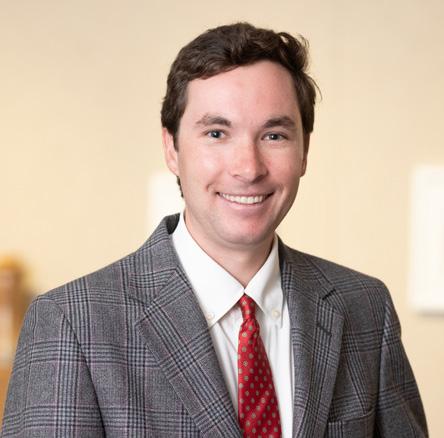
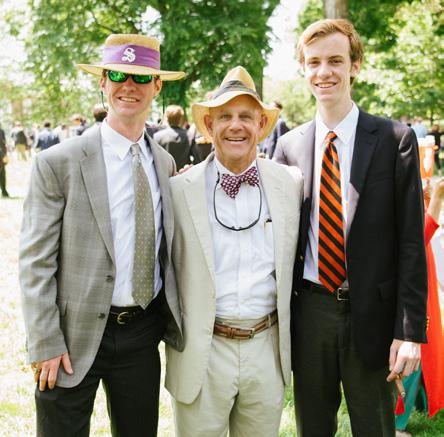
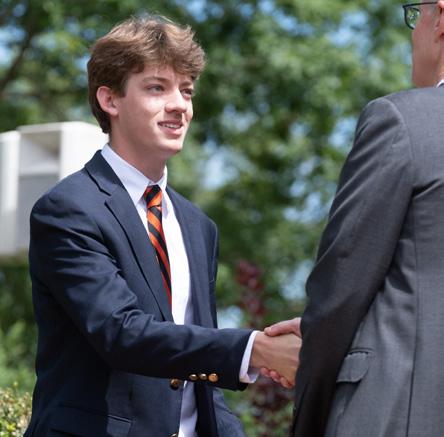
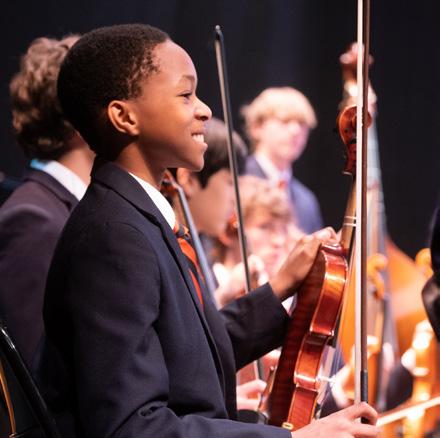



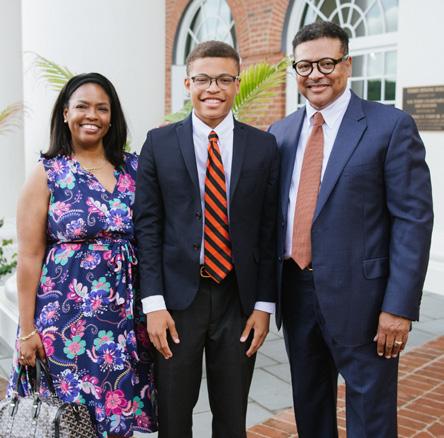







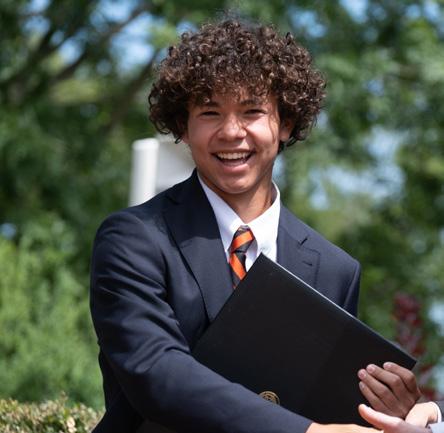

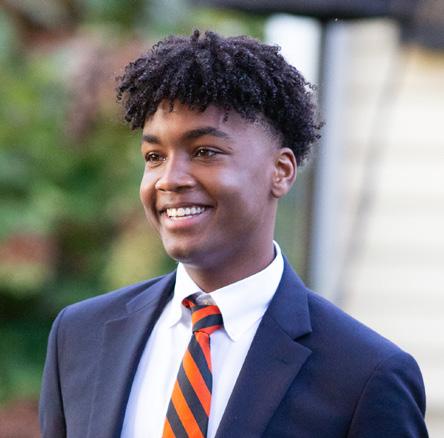

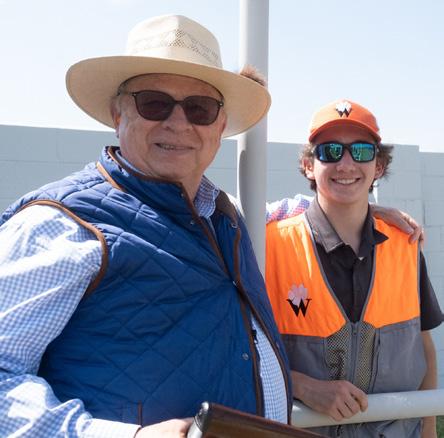


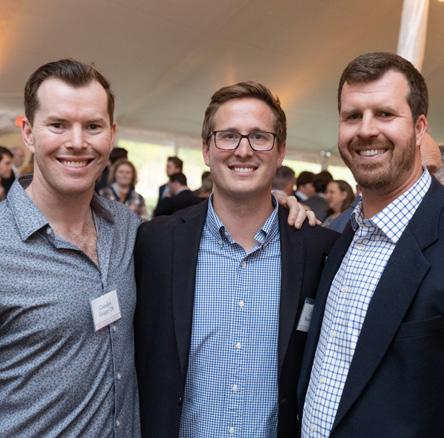
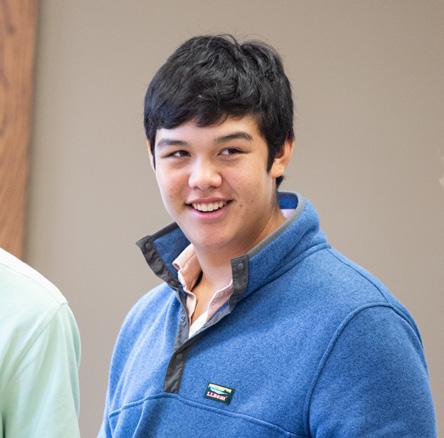
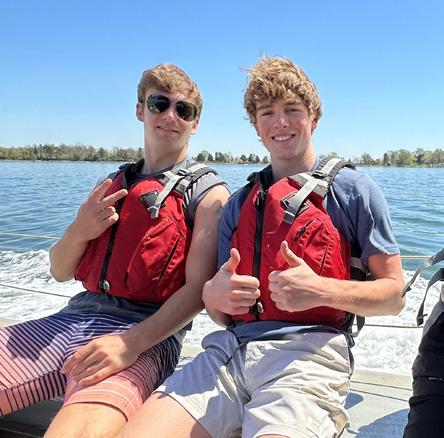


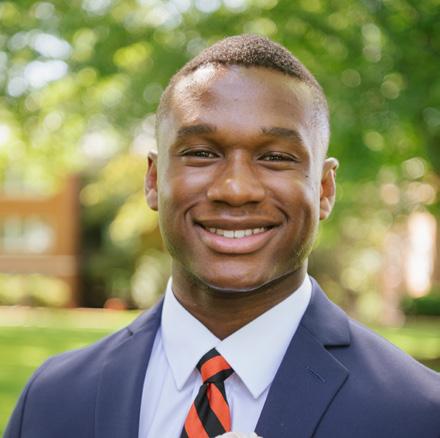



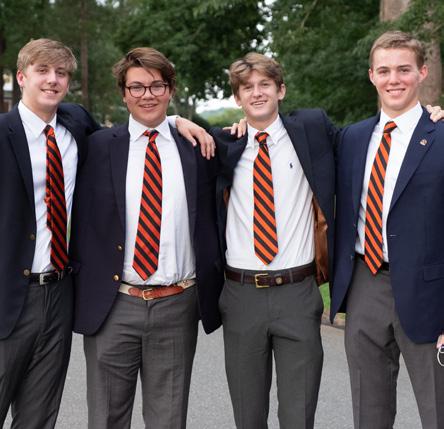
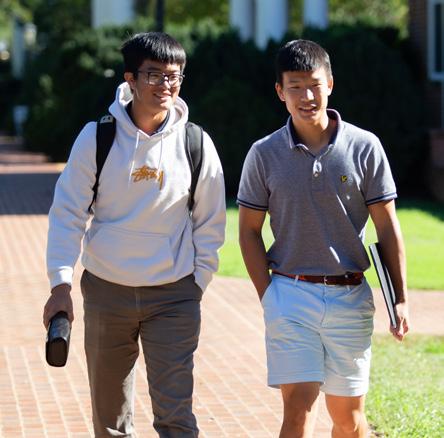









































 Byron Hulsey ’86 Headmaster Owen Thomas ’79 Chair of the Board of Trustees
Byron Hulsey ’86 Headmaster Owen Thomas ’79 Chair of the Board of Trustees
















































 WOODBERRY FOREST SCHOOL Campaign For the Boys
Campaign For the Boys WOODBERRY FOREST SCHOOL
WOODBERRY FOREST SCHOOL Campaign For the Boys
Campaign For the Boys WOODBERRY FOREST SCHOOL











































